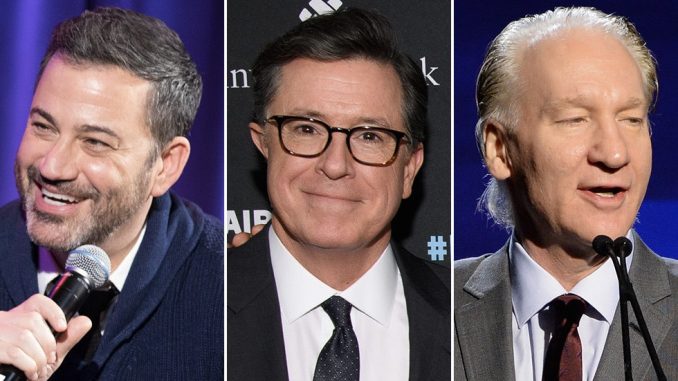
Humor could become permanently partisan in the post-Trump era, experts say, as comedians remain fixated on the former president instead of his successor.
While the current commander in chief is typically the target of jokes galore on late-night TV, President Biden has served as more of a pillow than a punching bag.
Following the often wild, drama-filled four years of the Trump administration, Jimmy Kimmel said on his show last week, Biden is “pleasantly boring.” The “Jimmy Kimmel Live!” host gently ribbed Biden for using a whispery “sex voice” when answering reporters’ questions at a press conference.
Stephen Colbert, one of former President Trump‘s fiercest late-night detractors, called that same voice “creepy” and joked at one point that Biden appeared not to know where he was, but he’s largely taken it easy on the incumbent. After the president last month snapped at a CNN reporter, Colbert mocked him for his “‘grandpa’s had it with your lip’ energy.”
And after four years of near-weekly sketches featuring Alec Baldwin as a bumbling and explosive Trump, “Saturday Night Live” is virtually Biden-less — cast member Alex Moffat, tapped to take over the role of the president from Jim Carrey late last year, was largely missing in action in the role as the show wrapped its 46th season.
That’s part of the reason that recently more pointed cracks directed at Democrats have turned heads.
Jon Stewart raised eyebrows — and elicited laughs — earlier this month as he repeated a theory frequently floated by GOP lawmakers: that COVID-19 was created in a Chinese lab. The former “Daily Show” host appeared on CBS’s “The Late Show,” telling Colbert, “There’s a novel respiratory coronavirus overtaking Wuhan, China.”
“Oh, you know who we could ask? The Wuhan novel respiratory coronavirus lab,” Stewart exclaimed, referring to the Wuhan Institute of Virology. “The disease is the same name as the lab!”
Just days earlier, Bill Maher, who has sharply criticized members of both parties in the past, diagnosed some Democrats as suffering from “progressophobia,” or a “brain disorder that strikes liberals and makes them incapable of recognizing progress.”
“If you think America is more racist now than ever, more sexist than before women could vote and more homophobic than when blowjobs were a felony, you have progressophobia and should adjust your mask because it’s covering your eyes,” the “Real Time” host and liberal commentator quipped.
In the Trump era, Fox Nation host and stand-up comedian Tom Shillue says, many comics simply “lost their sense of perspective.”
“They woke up in the morning thinking about [Trump], and they went to bed thinking about him, maybe because they were watching all the late-night monologues and most of the jokes are about Trump,” he says.
While comedy tends to shift with the change in presidential administrations, Shippensburg University political science professor Alison Dagnes says that prior to 2016, comedians would generally take a both-sides approach to their barbs. But with Trump’s shock White House win, says Dagnes, “comedians decided, ‘OK, we dropped the ball. We weren’t ringing the alarm bell loud enough. We’re going to go after him.’”
“They became far more partisan,” Dagnes says, with the mindset of “‘if [the audience doesn’t] agree with us, then we don’t care.’ They were fine with that.”
Comedian and “Daily Show” co-creator Lizz Winstead says she’s “been doing this and centering politics and social issues since the early ’90s, and there were years where you couldn’t do it in your sets.”
“Very few late-night shows, until Trump, focused profoundly on politics,” Winstead says.
Americans already fiercely divided by politics could come to see TV comedians less as sources of laughs and more as tribal team member — or opponents.
“Clapter is the term for an audience agreeing with your political point, but you weren’t funny,” says Dagnes, the author of “A Conservative Walks Into a Bar: The Politics of Political Humor.”
“So instead of laughing, the audience claps. Now, it’s just a lot more clapter than it is actual laughter. And people are OK with that,” she says.
To be fair, Trump gave comedians a lot to work with. Biden isn’t currently being sued by any adult-film stars, for example, or golfing regularly at clubs that he owns while making the Secret Service rent its own carts.
Now Trump’s out of office, but the zingers about him are still flying. With the ex-president holding rallies, frequently issuing several fiery news releases a day and doing TV interviews, many comics are still making him the topic du jour.
After the former president shut down a blogging section on his website last month, “Late Night” host Seth Meyers said on his show that Trump is “delusional and sociopathic, but somehow he’s the only person on Earth who knows when it’s time to shut down a blog.” Colbert dubbed Trump “Jabba the Gut” this week and questioned why he was allowed to hold rallies following the Jan. 6 riot at the Capitol. Knocking Trump for endlessly repeating unfounded claims of election fraud, Colbert exclaimed that Biden’s predecessor was “just so boring I’d rather set myself on fire.”
But it’s possible the comedic pendulum could swing again. Humor gurus say with Trump gone from the White House, audiences might be more open to hearing differing points of view from voices they’ve come to trust over the years such as Stewart and Maher.
“I’m not going to say that now people have an open mind overnight. I think that the door has just barely opened,” says Shillue, a regular contributor to Fox News Channel’s “Gutfeld!” and a former “Daily Show” correspondent.
With a Democratic president in office, Winstead, speaking more generally of the comedic scene, says, “I think it’s going to separate out people who really want to do really good, strong political material and people who did a lot of coasting on just sort of the surfacey garbage stuff that is Trump.”
But Dagnes, the co-host of the podcast “Utterly Moderate,” says rather than unite behind punchlines that hit at politicians of all stripes, partisanship could be one of Trump’s lasting effects on comedy.
“So Trump’s gone, but the audience is still very fragmented and very angry. He’s not in office anymore, but he sure did set the stage,” she says.
Winstead, a prominent abortion rights advocate, says there’s “a wealth of things to talk about with President Biden” — even if not all of the fans who laughed at Trump-related one-liners want to hear them.
“If you’re not being an honest actor in taking on anybody who is in the power chair, you’re just not really doing great political comedy. You want both sides to be mad at you on some level because you’re punching the bear,” she says.
“I can’t tell you how many people will say things like ‘We have Biden now! Stop it!’” says Winstead. “It’s like we have a new president now, with a whole new set of issues that we’ll talk about.”
No matter who it is, Dagnes says, the commander in chief is always going to be the No. 1 target for political jokes. “Will there be more jokes poked at the left? Sure, because Biden’s in charge and he’s a Democrat.”
“That’s what political comedy is. It’s the jester who makes fun of the king,” she says.
“Comedians are able to disarm people in a way that makes them aware of things, of looking at what’s right in front of us,” says Shillue. “If they can do it and they can make you laugh and tell the truth at the same time, that’s pretty powerful.”
Via The Hill


